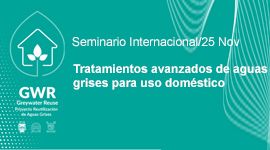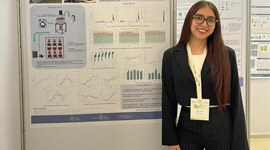You are here
It's important to prepare for a future in which there isn't enough water for everyone.

“In Brazil, many metropolitan regions have water shortage problems. For example, Victoria, the city where I live in southeastern Brazil, experienced a serious drinking water shortage two or three years ago," said Dr. Ricardo Franci, a Brazilian expert in graywater reuse, during the first international webinar organized by the GWR Project.
The online conference was well attended. There, he presented his work as an engineer and technical director of Fluxo Engenharia Ambiental, as well as his work as an academic and researcher at the Federal University of Espírito Santo. He has implemented graywater reuse systems for water security in numerous public and private corporate buildings (such as those of Petrobras and Rede Globo), as well as residential buildings, together with other Brazilian experts.
During the webinar, he mentioned “that about 15 years ago, the Brazilian government began a research program involving major Brazilian universities to develop technology for optimizing water use in buildings. I had the opportunity to coordinate this national network for five years, achieving important results, such as the development of a standard for using alternative water sources".
He explained that, given the current drinking water deficit experienced in several areas, “there is an intense discussion in Brazil about reengineering the urban water cycle. There is a lot of talk about it in different decision-making spheres in Brazil, and the focus is always on integration between the different levels of water resource management".
He explained that they have moved from analyzing the "macro" level of the basin to analyzing the "micro" level of consumption in buildings "because they represent 70% to 80% of urban water consumption”.
Dr. Franci also said that transferring water from the sewage system to a treatment plant and then returning treated water to homes is "very complicated, both technically and economically", so the goal is to install reuse systems in buildings. "This involves separating the different water flows within a building. Gray water, from showers, sinks, and washing machines, is of strategic interest due to its quantity and quality".
Ensuring Water Security
"Our research group has worked with several buildings, separating the gray water in order to treat it at a treatment station and use it for toilet flushing. Many buildings in Brazil practice reuse with this hydrosanitary system," said Professor Ricardo Franci during the online conference.
According to Franci, this type of graywater reuse project “requires multidisciplinary work with teams made up of architects, engineers, and, for treatment, biologists and chemical engineers, etc”.
He pointed out that simpler systems, such as wetlands, can be used for single-family homes. However, he indicated that mechanized systems with greater technology are required for multi-family buildings and other buildings because reused water "has to be very similar to drinking water so users do not perceive a difference." A system in which users doubt the quality of the water is not sustainable. Organoleptic characteristics are important to people.
Currently, a group of Brazilian experts and researchers are proposing municipal regulations requiring that "all new buildings be constructed with a hydrosanitary system allowing the use of alternative water sources, both present and future”.
This is due to the uncertainty regarding the water supply. “It's important to anticipate a future where there isn't enough water for everyone. That is an unknown. If a building has the ability to transition from conventional potable water consumption to potable and non-potable water consumption in the future, it guarantees water security and improves people's quality of life", concluded Dr. Ricardo Franci.
Full access to the conference is available at (spanish) https://www.youtube.com/watch?v=sAwvIfcB7Q0
News
 A successful seminar was held on advanced gray water treatment and...
A successful seminar was held on advanced gray water treatment and...
 The international academic network will present its advances in gray...
The international academic network will present its advances in gray...
 The GWR Project attended the Chemical Engineering Congress.
The GWR Project attended the Chemical Engineering Congress.

